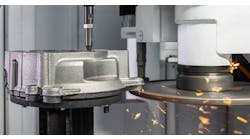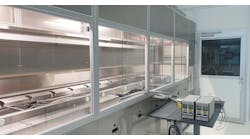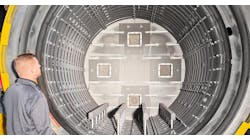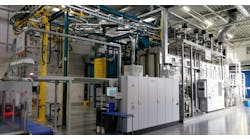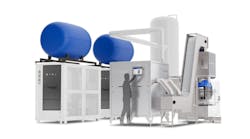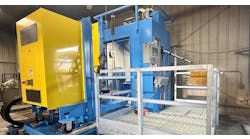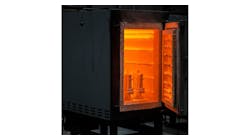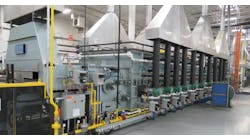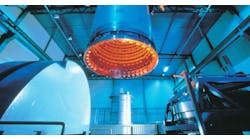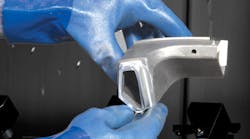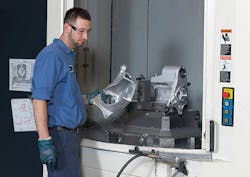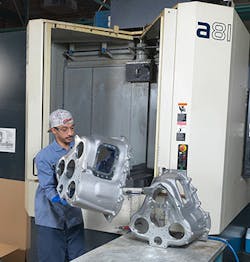It’s just 19 miles from Brook Park to Avon Lake, OH, but it’s a world away from where Dennis Daniels started his aluminum foundry. In 1972, all Daniels wanted to do was cast aluminum parts, so he set up shop in a small garage in Brook Park. He was the only employee. Secondary machining was no part of the plan.
Today, Daniels has 104 employees in an 110,000-square-foot foundry and machine shop in Avon Lake, supplying aluminum cast parts and finished subassemblies to global manufacturers of heavy trucks, autos, and industrial equipment. Secondary machining generates 40% of Alumalloy Metalcasting Co.’s revenue. It’s not the business Daniels expected to build, but it’s how Alumalloy developed its competitive advantage.
High-quality parts, on-time delivery and the best pricing matter most to casting buyers, and winning (and retaining) their orders means Daniels and his team depend on 10 Makino horizontal machining centers, beginning with the a81 mill purchased in 2007. These machines make it possible for Alumalloy to achieve repeatable tolerances as tight as 15 microns on some parts, and to meet deadlines consistently in a demanding production environment.
“Reliability for us is paramount. If we can’t keep the machines running every day, we can’t serve our customers,” said machining engineer Matthew Cole. “That’s why our production relies on the Makinos for the big jobs we need to keep going every day.”
Nothing in Daniels background prepared him to set up a machine shop, nor to embrace machining as the aluminum foundry’s growth strategy. He had worked for five years as a supervisor at a now-defunct aluminum foundry in Avon Lake, and left there to start his permanent mold casting business. As Alumalloy grew, Daniels moved the foundry from the garage in Brook Park to a larger facility in Cleveland. When a customer needed secondary machining, Alumalloy hired third-party machine shops to complete the parts. Too often, he felt, quality issues would be blamed on casting when in fact they occurred in the secondary operations. The third-party machine shops also frequently would push back deadlines, forcing Alumalloy to extend its lead times. To serve customers better, Daniels decided Alumalloy would machine its own parts.
In 1989, he purchased a used vertical machining center with fixtures. At that time, very few foundries owned CNC mills or employed machinists. Alumalloy was an early adopter, and so Daniels and his team had to learn machining on the job. They took advice from tool distributors and taught themselves how to operate their commodity mill. Daniels sent Cole, then one of his second-shift bandsaw operators, to machining classes at a local community college. Today, with two degrees in industrial engineering, Cole, oversees Alumalloy’s machine shop.
Alumalloy continued to expand its secondary machining, eventually adding four commodity mills and a lathe. However, the foundry/machine shop struggled with extended lead-times because of reliability issues, including poor chip removal and frequent way-cover replacements on the older machining centers. By 2006, while preparing to bid on a large job, Daniels decided to attend the International Manufacturing Technology Show to find horizontal machining centers for the expansion plan taking shape — to fulfill that new contract and to improve Alumalloy’s reliability and productivity.
At IMTS, Daniels was impressed by the Makino engineers’ knowledge of all aspects of the machining process. He said he also realized other Makino technologies he believed would make Alumalloy more competitive, like continuous-pressure hydraulic fixtures; broken-tool sensors outside of the machine area (BTSOMA); and simplified machine design that reduces reliability issues
That visit prepared Daniels to chart a new path for his company. In 2007, Alumalloy purchased its first a81 630-mm horizontal machining center. Over the next eight years, four more a81 machines and five a61nx 500-mm HMCs have been acquired.
To accommodate what’s become a full-service machine shop, Alumalloy purchased buildings that once housed the Avon Lake aluminum foundry where Daniels began his career. Alumalloy recently finished converting an abandoned sand casting area, and now the company has its mills arranged in two well-organized lines, with floor space to add more HMC. Air conditioning ensures the clean, well-organized plant maintains consistent workplace temperatures necessary to hold part tolerances.
More Parts, More Uptime
Since investing in the a81 and a61nx machines, Alumalloy maintains the reliability that customers rely on, and is able fulfill orders up to 50,000 parts. That improvement shows up every day on the machine shop floor. For example, the company has not had to replace a way cover on the a81 and a61nx machines, eliminating what had been a constant problem with the commodity equipment Alumalloy previously used. Also, chip removal is no longer an issue and downtime is limited to machine maintenance. The central coolant flush system on the a81 and a61nx machines effectively evacuates chips for improved quality and reliability.
“They’re simple machines, especially the way they handle chips. Other machine shops struggle with chips. We don’t,” Daniels said.
Cole added that he appreciates how the flexible control systems on the a81 and a61nx machining centers allow Alumalloy to move from conversational language to more complex programming “so we can do the kinds of stuff we always dreamed of.”
The continuous-pressure hydraulic fixtures Daniels shopped for at IMTS are installed on three of the a81 machines. Alumalloy runs bigger parts in large quantities for truck transmissions on these machines, and continuous-pressure hydraulic fixtures reduce the time needed to load and unload parts while delivering repeatable part locating and consistent clamping force. As a result, Alumalloy holds tolerances as tight as 15 microns on the heavy-truck transmission housings.
With high-performance machining capabilities in-house, Alumalloy is also able to use secondary machining as a quality assurance process for its foundry. Now, the company identifies exactly when and where any true quality issues arise and moves to resolve them before parts are shipped.
For a company originally centered on making aluminum parts with a single casting method, the makeover is remarkable. Alumalloy offers complete casting and secondary machining, ensuring consistent high quality and on-time delivery.
Alumalloy’s customers seek this start-to-finish capability across a wide range of part types and sizes. For Volvo, Alumalloy makes various engine and transmission parts and completes some subassemblies for its customers’ Volvo and Mack trucks. For General Motors, it makes safety-critical suspension sway bars, along with windshield corner brackets for the Chevrolet Corvette.
“We can offer the customer a full part that they can put on their vehicle. Without that, we’d be a quarter of the size we are today,” Daniels said.
Daniels and company control the quality of every part, from pouring to machining to subassembly, as needed. The capabilities Alumalloy offers from raw materials to finished parts set the company apart from competitors offering only foundry or just machining services. Alumalloy has even won back 18 parts orders that had gone to competitors in China. “Some of the customers we get now will only entertain a bid because we can do everything under one roof,” Daniels said.
To deliver “everything,” Alumalloy runs one extended shift and depends on the reliable performance of the a81 and a61nx horizontal machining centers. It has more than 100 part numbers with short runs, so the mills must be available continually.
“We don’t have that many machines, so obviously we do a run, changeover, do another run. If a machine is down for some reason, we would never be able to keep up,” Cole said. “Some jobs are put on the older machines when they are not as critical. If those machines go down, we can always move the jobs to one of the Makinos. We put our most important jobs on the a81 and the a61nx because we know they are going to run. They’re incredibly reliable machines.”
